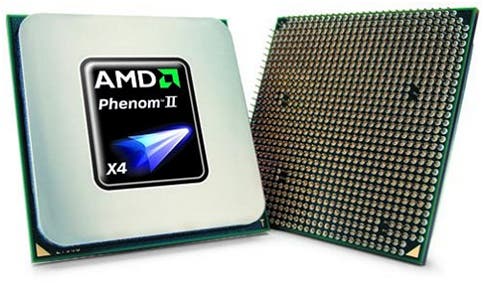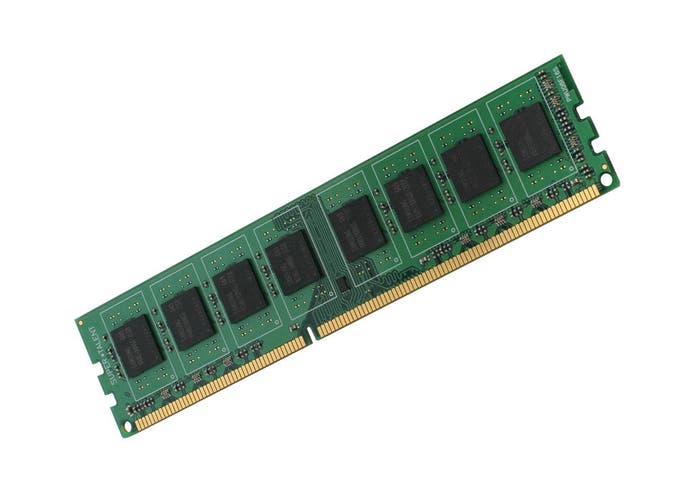How to Build Your Own Gaming PC
An idiot's guide.
5. The processor and motherboard
The processor, or CPU, is the "brain" of the PC, according to a Burger King placemat I read once. Modern games, however, depend much more on the graphics card than the CPU. In gaming PCs as in life, the brain matters a lot less than you might hope.
The gigahertz / cores / chipsets breakdown changes on a monthly basis, but processors are a commodity. As such you will notice they fall into a consistent price hierarchy, even as the technology evolves.
High-end processors are manufactured as a practical joke. In essence, Intel is daring you to purchase a CPU that is maybe 2 per cent faster than comparable products costing hundreds less. They put this precious jewel on the shelf and then sneak around the corner, trying to hold in their giggles as some dingus with a God complex walks up and buys the thing because he has to have the "very best".
Then there is the second tier. The prices are reasonable by comparison and their still-considerable power will come in handy for all that protein-fold analysis you do. What's that you say? You don't decode intensely complicated atomic structures on your PC? Rather, you play Desktop Dungeons and design flyers for your alt-rock band in Microsoft Paint? Right, that's what I thought.
In short, if you plan to spend more than £150 on your processor (and even that is a lot), it might be time for some soul-searching. Hie thee to the third tier.
Motherboards are pretty easy. Find the boards that are compatible with your processor's chipset. Next, find a midrange model that has plenty of slots and a number of decent user reviews. Buy that one. Sure, the most popular motherboard is not necessarily the best one, but at least if it stinks there are plenty of people suffering along with you.
6. The video card

Feel free to spend a little more on your video card as games rely on this component more than anything else. That said, you should still avoid the deep, pricey end of the technological pool, which is where the rubes swim. And, in all likelihood, where they pee.
If you're hooking your PC up to a huge, high-resolution desktop monitor, you're going to want a powerful card because it has a lot of pixels to push. (This is a colloquialism; the card is not literally pushing the pixels. In actuality, the process is more like a stern beating.)
I connected my gaming PC to my TV, a setup I recommend. A TV typically has fewer pixels than a comparable monitor, you see. Plus, my couch is eight feet away from the set. The viewing distance means that I can buy a cheaper card and the picture still looks great. Therefore, if you want to save money on a video card, move your couch.
7. The hard drive
Hard drives are cheap. Get a fast one. Anything slower than 7200 RPM, and you might as well chisel the ones and zeroes in there by hand. I mean, honestly.
The other consideration is size. Here is the formula for determining ideal hard drive capacity: take the number of times per week that you download internet pornography, and multiply that number times 100. This is the number of gigabytes your hard drive should have. (NOTE: Current drives generally max out at 3000 gigabytes, but you can buy more than one.)
An exciting new innovation is the advent of fast solid-state drives. Less capacious and far more expensive than traditional hard drives, today's SSDs are great for PC builders who find themselves in a "Brewster's Millions"-type situation, in which they must spend a huge quantity of money within 30 days so that they may inherit an even larger sum of money. Good luck!
8. Everything else
RAM is even cheaper than hard drives so there's no need to skimp. A pair of 2-gigabyte sticks, for a total of 4 GB, should do the trick. You must install the sticks in adjacent slots on your motherboard for maximum performance. Placed in such close proximity, each stick of RAM will fight to outperform its sibling and win your favour. They will grow to resent each other and, with time, you.

Do you need a sound card? If it is 1997: definitely.
You'll have to purchase an OS for your rig, which is to say Windows. Microsoft sells discounted editions for system builders; don't buy the regular boxed copy. You may have a friend who will urge you to try gaming on an open-source OS like Linux. This is a great opportunity to not be friends with that person anymore.
Buy your power supply last. There are a number of online calculators that can help you determine the right wattage (probably in the 500- to 600-watt range). Get more wattage than you need right now, to allow for later expansion.
The most reliable power supplies carry what is called an "80 PLUS" certification. This seal of approval indicates that the unit has undergone rigorous industry tests to ensure that it has at least 80, and sometimes even more than 80.
9. Put it all together
The parts will be shipped to your home in the finest cardboard boxes. Open these boxes and take the parts out. Put everything into the slot where it looks like it's supposed to go.
No kidding, it's not much more complicated than that. Sure, there are going to be gaps between the myriad instruction booklets you receive, and Tab A doesn't always slide effortlessly into Slot B. You'll have figure a few things out for yourself. But that's your deal - you're a gamer, right? You thrive on challenges like this.
Keeping that philosophy in mind, here are a few general tips to make your assembly go more smoothly.
- Always ensure that parts are seated firmly, yet do not apply excessive force.
- The tangle of wires coming from the power supply can be intimidating at first. Be patient; sort through the cables one by one.
- Minimise the number of tacos you consume while assembling the computer. If possible, eat no tacos (or, more reasonably, only soft tacos).
- If the PC doesn't work the first time you start it up, don't panic! Simply switch the computer off, put it in the garbage and begin again from Step 1.
- If you find that the verge depth of your anchor escapement is causing the wheel to bind up, you have mistakenly assembled a cuckoo clock.
10. Bask in your superiority
Congratulations! You have joined an elite group: those who dared to build it themselves. Granted, you didn't do much more than place a bunch of pieces in their respective holes - you "built your PC" in the same way that a guy who screws in a light bulb has "invented electricity".
Still, you should be proud. Now it's time to reward yourself with - what else - a pleasant afternoon of gaming. So fire up that Xbox and enjoy. You've earned it!
